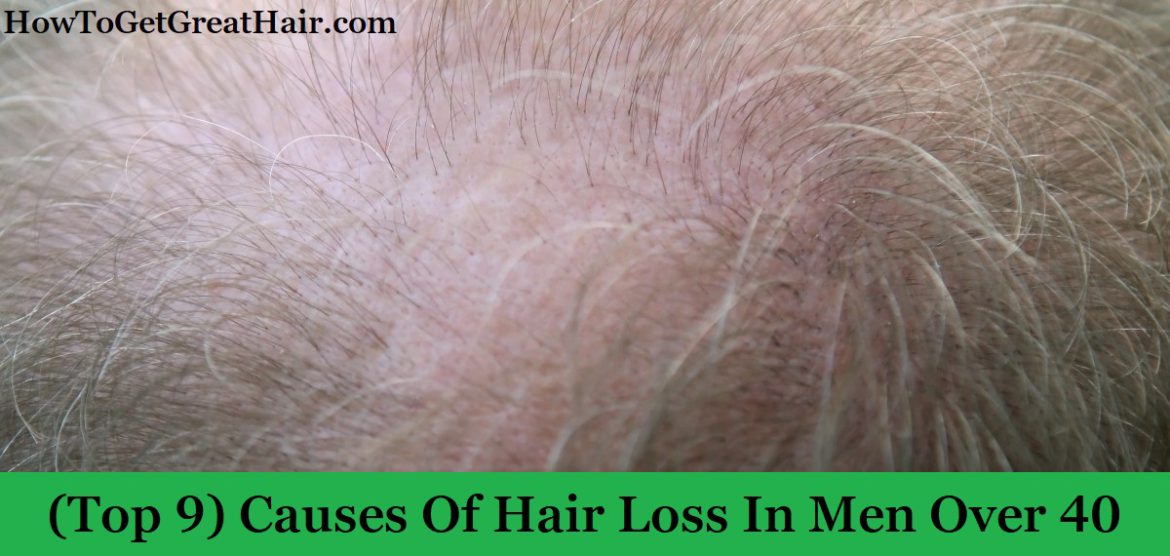
Are you a male dealing with shedding? You’re not alone.
Around 53% of men develop hair loss after turning 40. [1]
But not matter how common it is – what’s the reason behind? What is making your hair fall out?
Well – here are the top 9 causes of hair loss in men over 40.
Note: There are about 97% chances that your problem is on this list, so analyze it closely.
Contents
Here are the top 9 causes of hair loss in men over 40:
- DHT Excess
- Auto-Immune Alopecia
- Genetics
- Bad Diet
- Untreated Infections
- Hot Treatments
- Mere Aging
- Certain Drugs
- Excessive Stress
So let’s start by finding out the #1 responsible for make your hair fall out.
#1 – DHT Excess
This is definitely the biggest responsible for male hair loss in general.
It’s behind around 80% cases of hair loss in men (which is huge). [2]
1. Why?
DHT is actually a form of testosterone – nothing wrong so far.
And even though it’s essential for male development, DHT also has a negative side:
- its level raises after a certain age (45-50)
- this causes prostate enlargement
- it also affects hair follicles
Basically – DHT is vital in early males. But its levels can grow with age – and that’s when it starts to harm your body.
Even though it doesn’t necessarily affect your health – DHT does affect the hair follicles and produces hair loss.
But that’s not all:
- At first, it causes hair thinning and shedding.
- In time, it can destroy hair follicles.
- This means the lost hair will never grow back.
- That’s how baldness comes up.
That’s why DHT is responsible for over 70% of hair loss cases in men.
2. Solutions
There are some – but none of them works in 100% cases.
Because once your hair follicles are dead – it’s really had to revive them.
It can happen, but it’s going to take a lot longer (compared to a person whose follicles aren’t dead).
At this point – there are 2 drugs FDA approved for male hair loss:
- Finasteride (a supplement)
- Minoxidil (a topical solution in 2% or 5%)
Even though these products are helpful for many, they have some serious downsides:
- can cause serious side effects
- not effective in over 10% of men
- need a long time to work
For this reason, I personally recommend a herbal remedy (no side effects and real efficiency).
I’m talking about Saw Palmetto – which is recognized as the #1 natural DHT blocker. [3]
If taken in the right combination (a certain supplement), it can really help baldness on the long term.
#2 – Auto-Immune Alopecia
Ever heard of Alopecia Areata? That’s exactly what I’m talking about.
Though some say it’s caused by stress – evidence shows it’s an auto-immune problem. [4]
1. Why?
As with most auto-immune conditions, the actual cause is unknown:
- Genetics can be an important factor
- A stressful lifestyle also increases the risk
- Having another auto-immune condition puts you at risk
But basically – you can’t control whether you can develop this disease or not.
So what exactly does it cause?
- Hair falls out in certain places of the scalp.
- Bald patches.
- In most cases, hair grows back normally.
- But in about 5% of cases, this doesn’t happen.
- So those people end up losing all their hair.
Now – this condition appears in both genders. Actually, it’s a pretty common cause of hair loss in women as well.
2. Solutions
Since it’s an auto-immune condition, topical remedies and supplements might not help.
For this reason, my #1 advice is to consult a doctor.
With the proper treatment – you can keep your alopecia under control.
Otherwise, it will be pretty hard.
#3 – Genetics
That’s another serious responsible for male hair loss.
And even though you might be very aware of it – there’s not much you can do to prevent it.
1. Why?
Basically – this condition is called Androgenetic Alopecia and it’s not very rare:
- caused by inherited genes
- begins with thinning hair
- makes hair follicles shrink and die
In short, it’s a problem that runs throughout family generations.
Even though some sources link alopecia genes to maternal side – most scientists disagree. [5]
However, one thing is clear:
- Genetic alopecia can start in teenage years.
- It can destroy hair follicles completely.
- There are very few useful remedies against it.
2. Solutions
Assuming you have alopecia in your family – what can you do to prevent it in your case?
- Consult a specialized doctor.
- Start a treatment with Finasteride (or any drugs he recommends).
- Try having a healthy lifestyle (fresh foods, no alcohol, cigarettes, etc.).
Among the herbs you can try – green tea is one of the best. It blocks DHT and prevents the follicles from dying.
But even so, there’s no certain solution for genetic alopecia.
And in some cases – none of these remedies help.
#4 – Bad Diet
It might sound funny – but poor eating habits can also affect a man’s hair.
Compared to women, men follow a lot less diets.
But simply consuming the wrong foods on the long term can impact your hair.
1. Why?
Nutrient deficiencies can make your hair loss – that’s not something new.
But what nutrients can affect a man’s hair? Pretty much the same as in women:
- certain vitamins/minerals
- proteins
- biotin
Besides this, trying to lose weight with a strict diet can also impact your hair (negatively).
It’s true that those cases are rare – but they do exist.
Mostly, it happens when you’re on a poor diet for a longer period. Your hair won’t be affected immediately.
2. Solutions
In this cases – the future looks bright:
- hair loss caused by poor eating is temporary
- your hair will recover alone with the right foods
- it only takes time
So basically, what you need to do is have a blood test and check your nutrients levels.
Afterwards, adjust your diet so that you can eat foods rich in that certain nutrient you lack.
In a few months, both your body and your hair should recover completely.
#5 – Untreated Infections
That’s a pretty rare cause of hair loss, but it does exist.
Certain scalp infections can affect your hair’s health and make it fall out.
And I’m not talking about common problems like psoriasis or dandruff.
1. Why?
First of all – scalp problems usually don’t affect the actual hair.
But there’s a tiny number of conditions that do:
- Folliculitis
- Scalp Ringworm
- Lichen Planopilaris
All these conditions cause hair breakage or bald patches.
Normally – hair grows back as usual, so the roots aren’t affected.
But even so, losing a patch of hair overnight can turn into a real trauma.
2. Solutions
In this cases – only a medical consult can help.
Once you developed a scalp infection, you need a prescribed treatment from a specialist.
Otherwise, your problem won’t go away too soon – on the contrary, it will worsen.
But on the positive side – scalp infections are really easy to treat with the right medication.
So your hair should recover really fast.
#6 – Hot Treatments
Hair treatments are extremely rare among men.
But according to some sources – hot oil treatments can really damage a men’s crown, leading to serious shedding.
1. Why?
First of all – what kind of treatments could a men have?:
- Perms
- Hot oil treatments
- Dreadlocks (though they’re not an actual hot treatment)
As I said, these aren’t necessarily very common. So if you never had this kind of treatment – just skip this cause.
But in men who follow them, they could be a real cause of hair loss:
- damage hair ends
- can affect the follicles
- weaken hair structure
2. Solutions
Fortunately – I have some good news here.
If your hair started falling after a treatment you have, just make sure you won’t repeat it.
Other than that – use plenty of hair masks and topical remedies that will keep your hair moisturized.
In a couple of months, it should recover pretty well.
#7 – Mere Aging
Believe it or not, aging itself can cause shedding.
The simple fact that you’re growing older can make your hair not respond as usual.
1. Why?
According to recent studies – the cause is pretty unknown.
But one thing is clear:
- In certain older people, hair follicles stop growing.
- Instead, they remain in a resting phase.
- At one point, the resting follicles die.
- That even though they are properly nourished and lubricated.
Now – certain old men don’t have DHT excess, which usually cause male hair loss.
But even so, they still go bald after 60-70.
In these cases, it’s all about aging hair loss – that isn’t fully understood at this point.
2. Solutions
Unfortunately, there’s no actual remedy for that.
Certain supplements can help – but I mostly recommend the ones based on herbs.
Hair vitamins and minerals usually don’t help, since the hair is already well nourished.
So even though there’s not major solution, sometimes herbs can help.
#8 – Certain Drugs
As you might expect, medication can also affect hair.
And even though most drugs are harmless – some can have an impact on male crowns.
1. Why?
Certain drugs interfere with your hair’s growth cycle.
Others simply weaken the follicles and make it fall out.
But overall – there’s a group of medicines that can affect your hair:
- Immunosupressants
- Beta Blockers
- ACE Inhibitors
- Anti Depressants
- Acne Drugs
- Gout Medication
- Chemotherapy
And the list could go on for a while. As you might see, there are lots of drugs that can cause shedding.
However – this is a side effect that appears in less than 1% of users.
So if a drug from this list affects your hair, chances are that the next one won’t.
2. Solutions
Fortunately – the hair loss is temporary in most cases.
So all you have to do is to talk to your doctor and have your treatment changed.
This should solve the problem quite fast.
#9 – Excessive Stress
Last but not least, long term stress can also affect your hair.
But it’s not as bad as you might think.
1. Why?
First of all – stress doesn’t affect men’s hair as much as women’s.
The explanation is simple:
- stress weakens hair ends in women
- in most cases, hair becomes fragile
- eventually, it falls out
When it comes to men – hair tends to be shorter.
For this reason, the ends can recover a lot faster (compared to women).
So how can stress cause hair loss in men?
Well – it’s mostly long term stress that is very constant.
Working 8 hours a day shouldn’t be a reason of excessive stress. But a trauma might be.
2. Solutions
In this case, it’s hard to solve the problem.
Simply giving up the stressful situation isn’t an option. But certain things might help:
- picking up a new hobby
- doing something you enjoy
- using some natural hair remedies
Basically – hair should recover alone, but it’s going to take a while.
My Verdict – So What’s Causing Your Hair Loss?
Short answer: Most likely – it’s DHT excess.
That’s the responsible for over 80% cases of hair loss in men.
However – it’s not the only one. Your problem might actually be caused by:
- Family history
- Bad eating habits
- Alopecia Areata
- Vitamin/Mineral deficiencies
- High stress
- Certain drugs you’re on
And the list could go on for a long while. So what should you do next?
- Consult a doctor/specialist
- Have your blood tests done
- Look into your family’s history and see if anyone had the same issue
- Try to find an activity that will take your mind off this
- Use a herbal supplement to speed up your hair recovery
Basically – it depends a lot on what your actual cause is.
But once you discover it, things should get a lot easier.
And there are over 90% chances that the cause behind your hair loss is on this list.
1 – https://www.ncbi.nlm.nih.gov/-pubmed/9865198
2 – https://www.ncbi.nlm.nih.gov/-books/NBK430924/
3 – https://www.ncbi.nlm.nih.gov/-pmc/articles/PMC2840915/
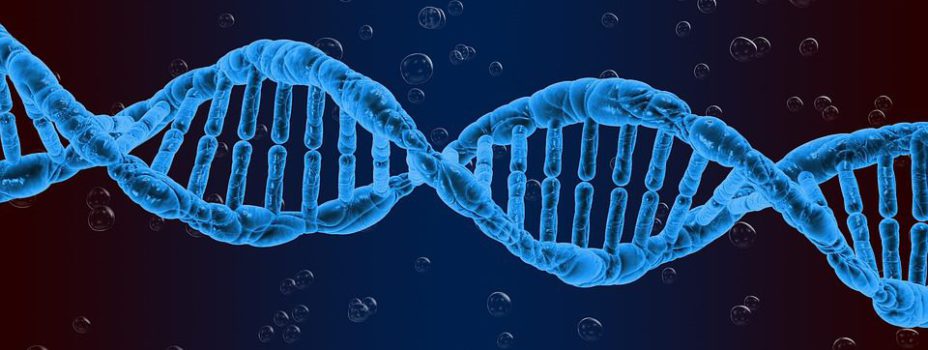
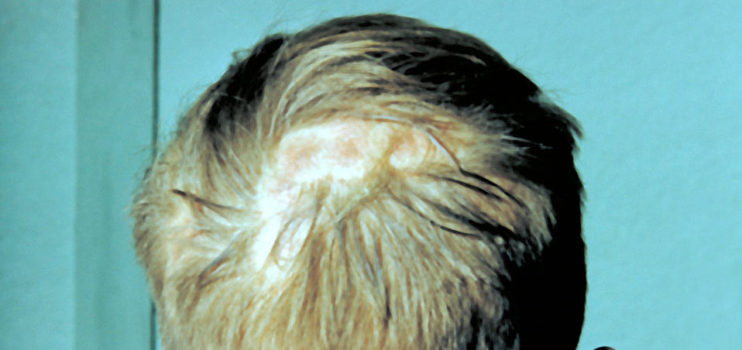
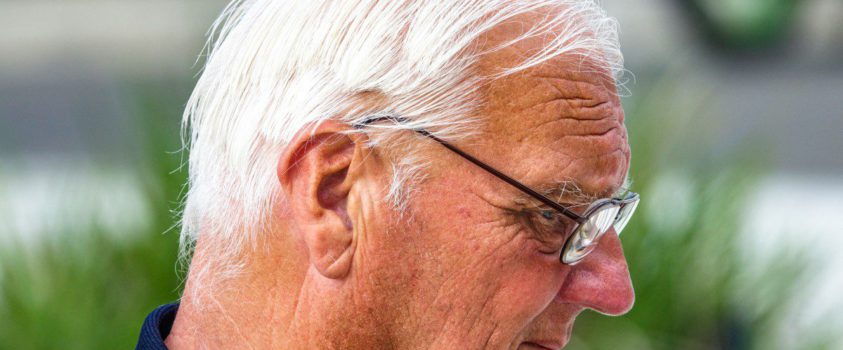


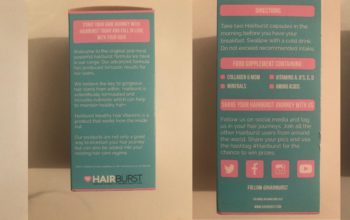
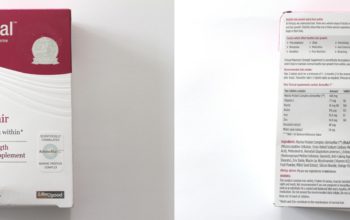

Hi Olly! My dad is 69 and has recently been diagnosed with gout. He started the treatment (guess it’s about 2 months now) and in the last weeks he started losing hair massively. This means his hair is falling out a lot, more than 150 hairs a day. I guess that’s more than it’s normal for women.
He never had really thick hair but he kept it even at his age, he had no sign of baldness before this treatment. Now he’s got some spots with thinner hair and it’s been only a few weeks since it started falling out. I’m looking for a fast remedy for him, do you think anything would help? You say that DHT is usually causing hair loss in men but I’m not sure if he’s got this issue. Do you think it could be the drugs or it’s just a coincidence? Please answer fast and thanks.
Hello Lloyd, sorry to hear about your father’s problem. But in my opinion, it’s 99% caused by the drugs he recently started. I know it’s been 2 months since he began taking them, but hair loss doesn’t happen overnight (especially when the roots are affected). It usually needs around 1 and 3 months to start.
Let’s say you started the treatment say July – so you might experience a hair loss at the end of August until October. In case it appears afterwards, it’s probably not caused by that treatment. So that’s basically how hair loss goes, it usually appears a few months after the factor/even that caused it.
Therefore, the best advice for your dad would be to have his treatment changed. Gout is a serious affection so he can’t just stop the treatment. But most likely – one of the drugs he’s using is affecting his hair (in case he’s taking more). Gout medication can cause hair loss as a side effect, so his situation is not surprising at all.
So instead of recommending him any supplement – I think you should have him consult his doctor and ask for a treatment change. The hair loss might not stop immediately, but it should get better on its own in a few weeks.
In the meantime, he can start using some hair vitamins for an extra root nutrition (with his doctor’s consent, obviously). Also, hair fibers can help him hide the potential bald spots or thinner hair portions. You can find many brands on Amazon and they all have different shades of fibers (even white ones). This should help him.
Please keep me updated about his condition and whether his hair loss gets better once he has a different treatment. I hope this helps!